MEPC 70: IMO Moves Towards Arctic Phase Out of World’s Dirtiest Fuel
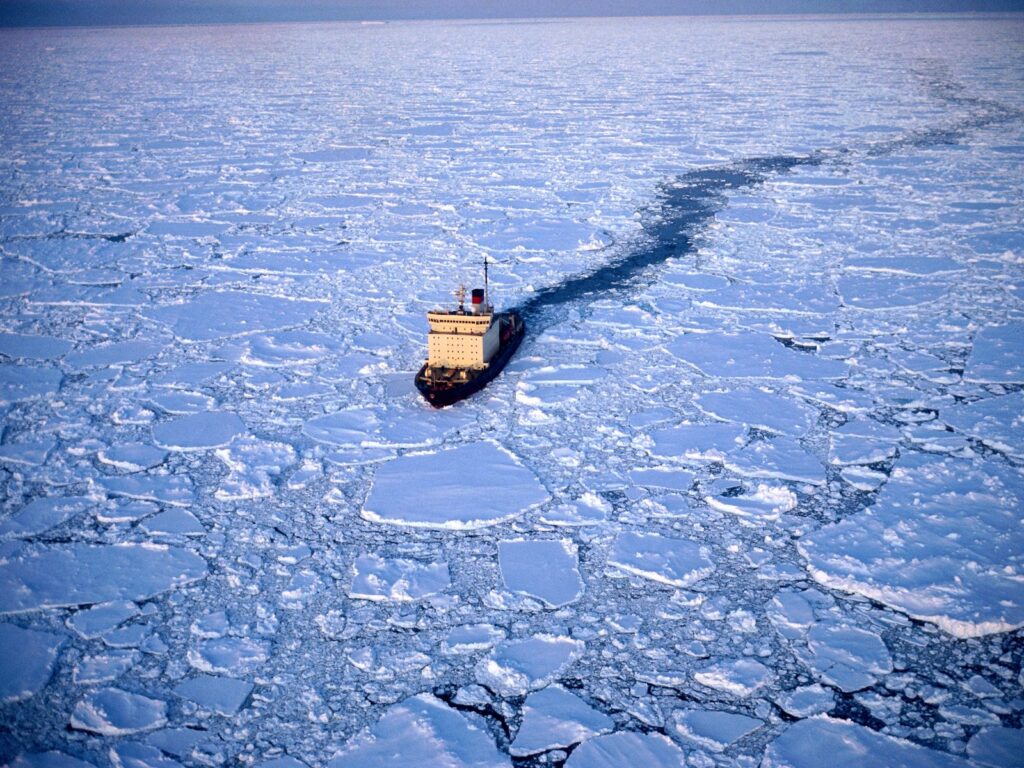
As the International Maritime Organization’s Marine Environment Protection Committee (MEPC70) meeting came to a close today, the Clean Arctic Alliance welcomed the progress made by member countries towards a phase out of the use of heavy fuel oil (HFO) by vessels operating in the Arctic
Heavy fuel oil use in Arctic shipping in 2015
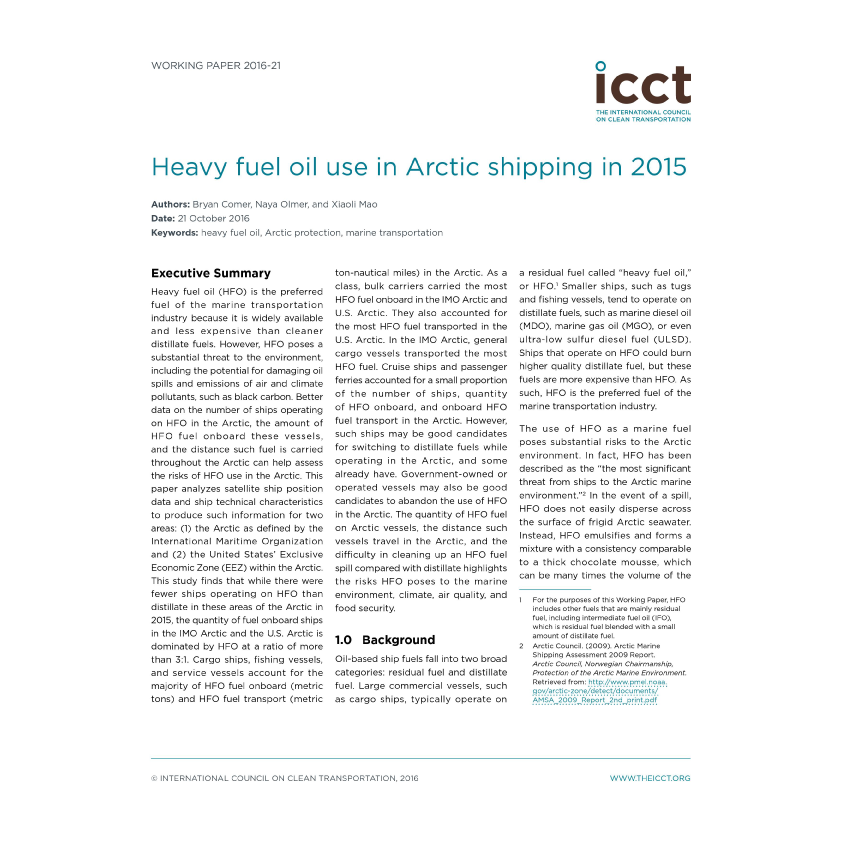
A working Paper by the International Council on Clean Transportation (icct)
This paper provides valuable data on the number of ships operating on HFO in the Arctic, the amount of HFO fuel onboard these vessels, and the distance such fuel is carried throughout the Arctic in 2015. It finds that while there are fewer ships operating on HFO than distillate in the IMO Arctic and the U.S. Arctic, the quantity of fuel onboard ships in both areas is dominated by HFO at a ratio of more than 3:1.
Heavy fuel oil use in Arctic shipping in 2015

A working Paper by the International Council on Clean Transportation (icct)
This paper provides valuable data on the number of ships operating on HFO in the Arctic, the amount of HFO fuel onboard these vessels, and the distance such fuel is carried throughout the Arctic in 2015. It finds that while there are fewer ships operating on HFO than distillate in the IMO Arctic and the U.S. Arctic, the quantity of fuel onboard ships in both areas is dominated by HFO at a ratio of more than 3:1.
Infographic: Risks & challenges of Heavy Fuel Oil use in the Arctic
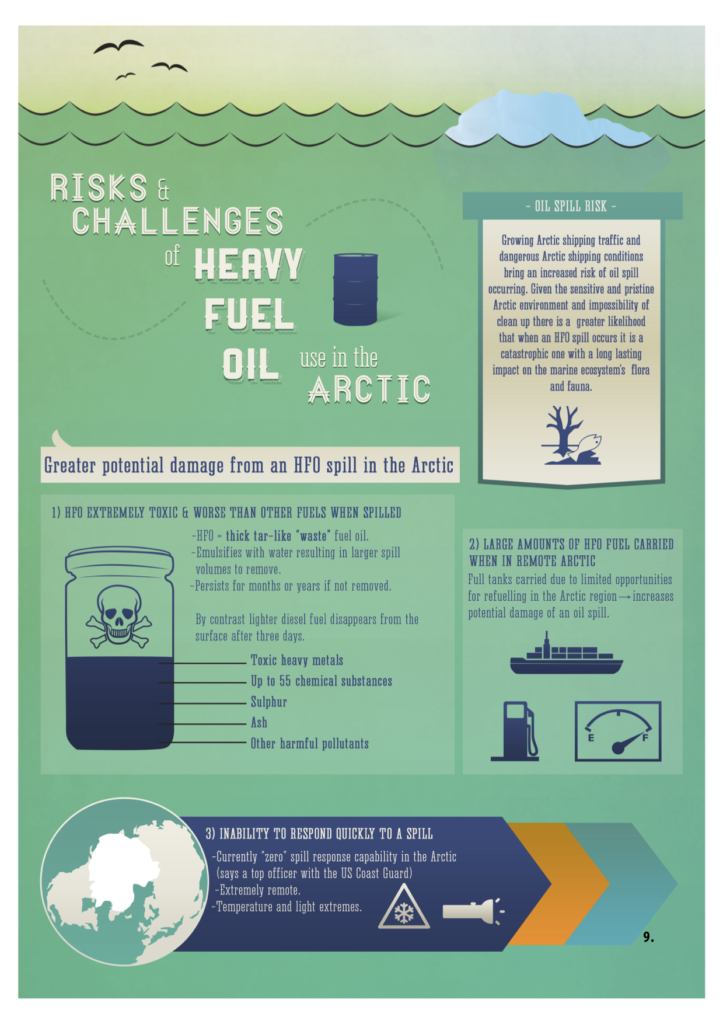
Increased shipping activities and changeable shipping conditions provide the backdrop of this comprehensive and visual representation of the many threats facing the Arctic environment, from heavy fuel oil spill, with catastrophic long-lasting consequences on this remote and vulnerable ecosystem, local indigenous populations’ health and food security to illegal waste sludge dumping. Increased Black Carbon and other air pollutants emissions only accelerate climate change and add to the problem of ice melt.
Risks & challenges of Heavy Fuel Oil use in the Arctic
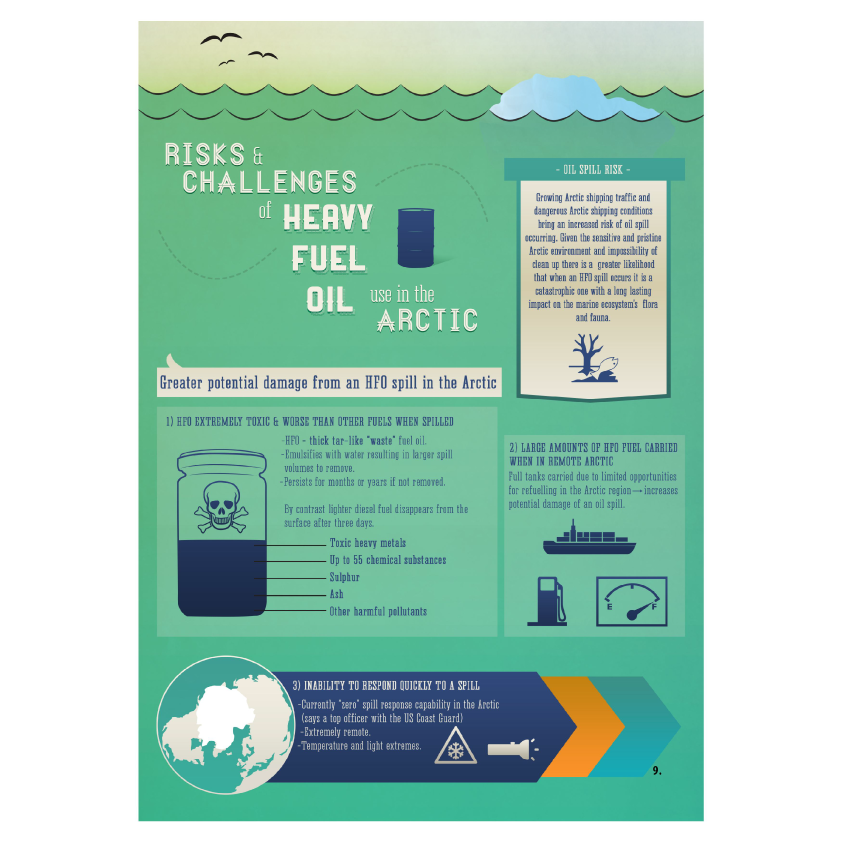
An infographic by the European Climate Foundation
Increased shipping activities and changeable shipping conditions provide the backdrop of this comprehensive and visual representation of the many threats facing the Arctic environment, from heavy fuel oil spill, with catastrophic long-lasting consequences on this remote and vulnerable ecosystem, local indigenous populations’ health and food security to illegal waste sludge dumping. Increased Black Carbon and other air pollutants emissions only accelerate climate change and add to the problem of ice melt.
Proposals for mitigating the risks associated with the use and carriage of HFO by vessels in the Arctic
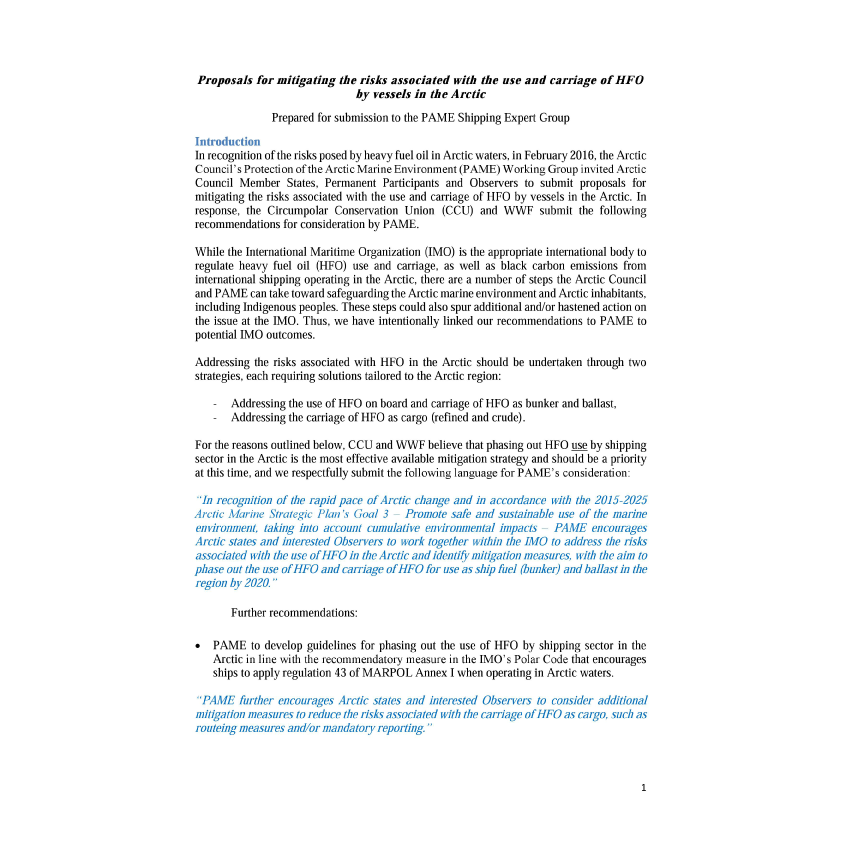
A submission by the Circumpolar Conservation Union (CUU) and WWF
This submission to the Arctic Council’s Protection of the Arctic Marine Environment (PAME) working group outlines why phasing out HFO use by the shipping sector in the Arctic is the most effective available mitigation strategy to address the associated risks and provides further recommendations.
Risks & challenges of Heavy Fuel Oil use in the Arctic

An infographic by the European Climate Foundation
Increased shipping activities and changeable shipping conditions provide the backdrop of this comprehensive and visual representation of the many threats facing the Arctic environment, from heavy fuel oil spill, with catastrophic long-lasting consequences on this remote and vulnerable ecosystem, local indigenous populations’ health and food security to illegal waste sludge dumping. Increased Black Carbon and other air pollutants emissions only accelerate climate change and add to the problem of ice melt.
MEPC 70: International Maritime Organization Urged to Drop World’s Dirtiest Fuel
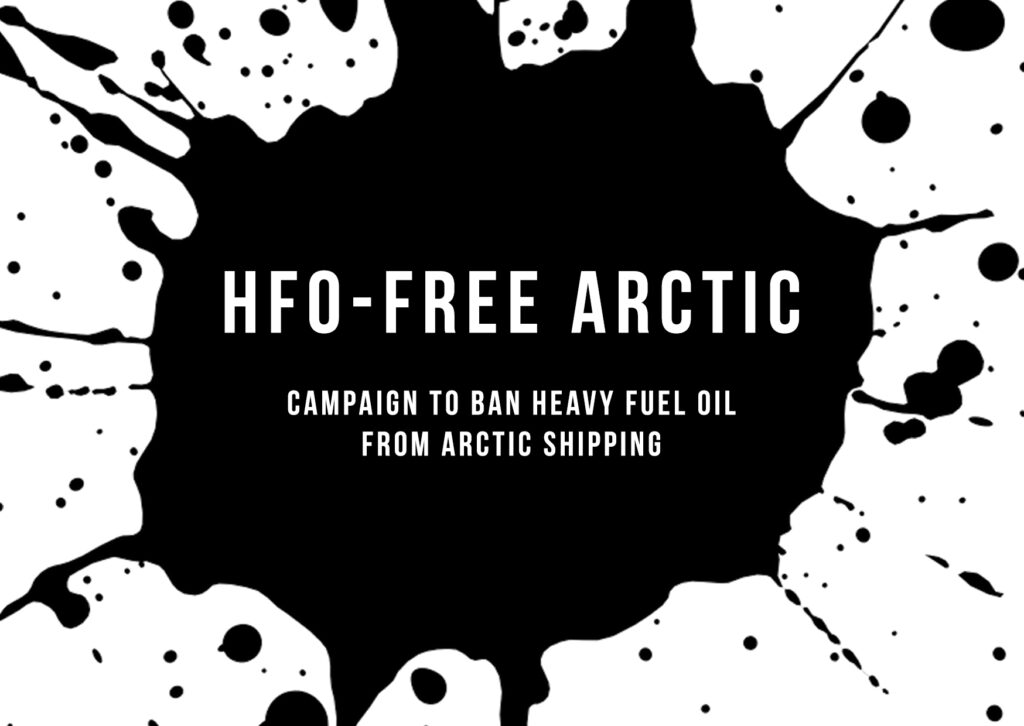
As the International Maritime Organization’s Marine Environment Protection Committee meeting opened today in London, the Clean Arctic Alliance called on IMO members to end the use of heavy fuel oil (HFO) in Arctic waters.
Clean Arctic Alliance Position Statement on Heavy Fuel Oil in the Arctic
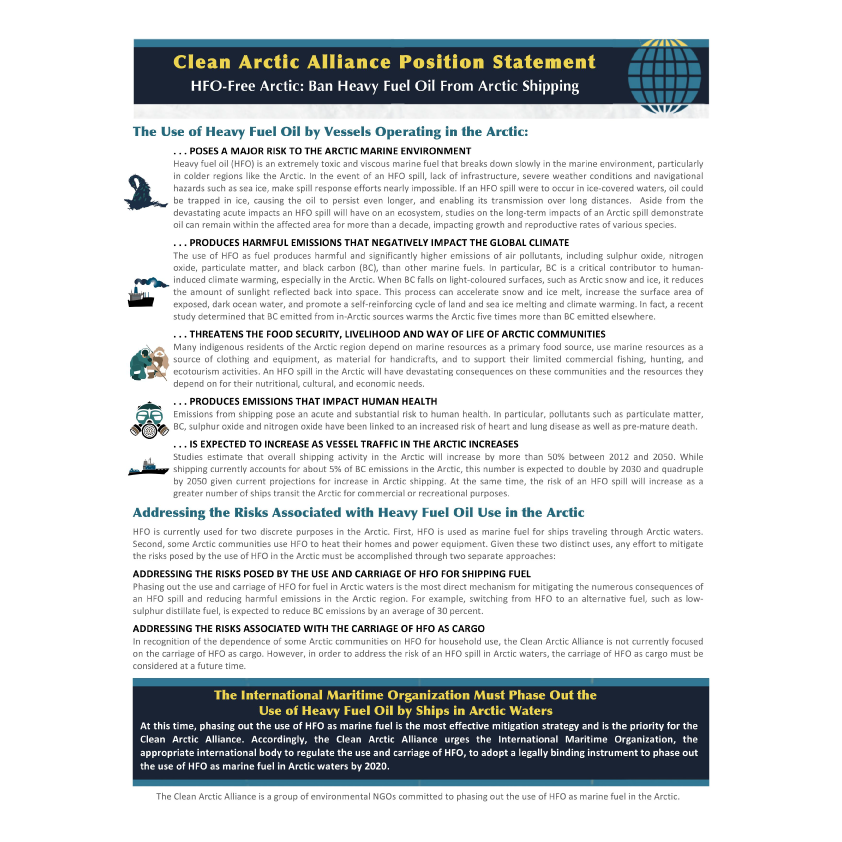
Position Statement by the Clean Arctic Alliance – HFO-Free Arctic: Ban Heavy Fuel Oil from Arctic Shipping
The use of heavy fuel oil (HFO) by vessels operating in the Arctic poses a major risk to the Arctic marine environment. It produces harmful emissions that negatively impact the global climate, threatens the food security, livelihood and way of life of Arctic communities and produces emissions that impact human health. As the use of HFO is expected to rise as vessel traffic in the Arctic increases, the Clean Arctic Alliance strongly advocates the phasing out of the use of HFO as the most effective mitigation strategy as a matter of priority.
Infographic: Risks & challenges of Heavy Fuel Oil use in the Arctic

An infographic by the European Climate Foundation
Increased shipping activities and changeable shipping conditions provide the backdrop of this comprehensive and visual representation of the many threats facing the Arctic environment, from heavy fuel oil spill, with catastrophic long-lasting consequences on this remote and vulnerable ecosystem, local indigenous populations’ health and food security to illegal waste sludge dumping. Increased Black Carbon and other air pollutants emissions only accelerate climate change and add to the problem of ice melt.

